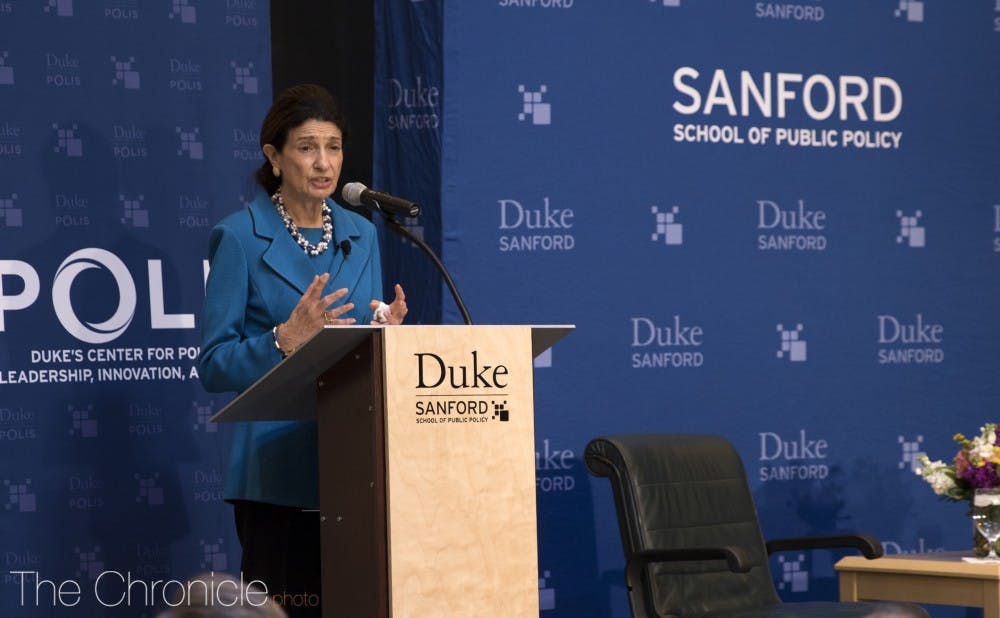Former Sen. Olympia Snowe (R-Maine) visited campus Monday to give the 2018 Crown Lecture in Ethics entitled “Politics and Our Potential: Can Congress Rise to Meet Its Obligation to Govern?” Snowe has long advocated for reaching across the aisle in order to effectively govern. Prior to her speech, The Chronicle's Jake Satisky spoke with her about her career in politics and her work since leaving office. This interview has been edited for length and clarity.
The Chronicle: What motivated you to get into politics, and once you were there, what kept you there?
Olympia Snowe: First of all, I ran when my first husband—who was in the state legislature—was killed in a car accident. So I ran for his seat in the special election because people said, "You know, why don't you run?" It was a difficult decision in the midst of all that turmoil but I decided to because I had a passion for politics. I decided I had to run again to see if this was something I wanted to do, so I ran for re-election, and then it went on from there.
I just loved the idea of being able to use the power of the office to do good and solve problems, and I enjoyed meeting people, talking about their issues and making government work. Did I know I was going to serve 40 years in public office? No. It was that one decision, and that one decision ultimately set me on a journey for 40 years in public office and it became my passion.
TC: You've never lost an election. What's your secret?
OS: Well, I think this goes for everybody, but working hard. I worked hard and I really thought it was important to listen to the people I was representing. I tried to stay in touch as much as possible by going home routinely.
Often your constituents may not always agree with what you do but it is important for them to know you, to like you and to trust you, so ultimately when you have to make a difficult decision they understand where you're coming from and how you approach the tough decisions because they get a better sense of who you are. People in my state expect their elected officials to do the right thing in the right way for the right reasons.
TC: How did you get people from the other side to work with you?
OS: You approach them. For example, when I first arrived in the Senate in 1995, within the year there was a government shutdown, so a group of us developed a bipartisan coalition. We met during the shutdown and drafted a budget that actually was balanced, and after the shutdown concluded, we took it to the floor, and although we didn't prevail—we were a few votes short—people were surprised that we were successful to put a budget together on a bipartisan basis and almost prevail.
Ultimately that budget was a template for the balanced budgets that occurred for four straight years. A group of us got together believing that it was totally unacceptable that we were in the midst of this shutdown, and we were determined to show that bipartisanship existed in the senate and we wanted to send the right message to the American people.
TC: Has it been difficult being on the outside looking in?
OS: No, because I'm with the Bipartisan Policy Center in Washington, so I get the opportunity to work on these issues with former colleagues by taking solutions to Capitol Hill. I give speeches around the country talking about the imperative of supporting those who are willing to compromise and build consensus, and I wrote a book "Fighting for Common Ground" to identify ways in which we can address some of the challenges that are facing us in the current environment.
TC: So you are enjoying retirement?
OS: Yes I am. [laughs] But I'm not retired, just out of office. It surprised me as much as anybody that I chose not to seek reelection, but I realized that change wasn't going to come from within the institution—it has to come from the outside.
Get The Chronicle straight to your inbox
Sign up for our weekly newsletter. Cancel at any time.

Jake Satisky was the Editor-in-Chief for Volume 115 of The Chronicle.

